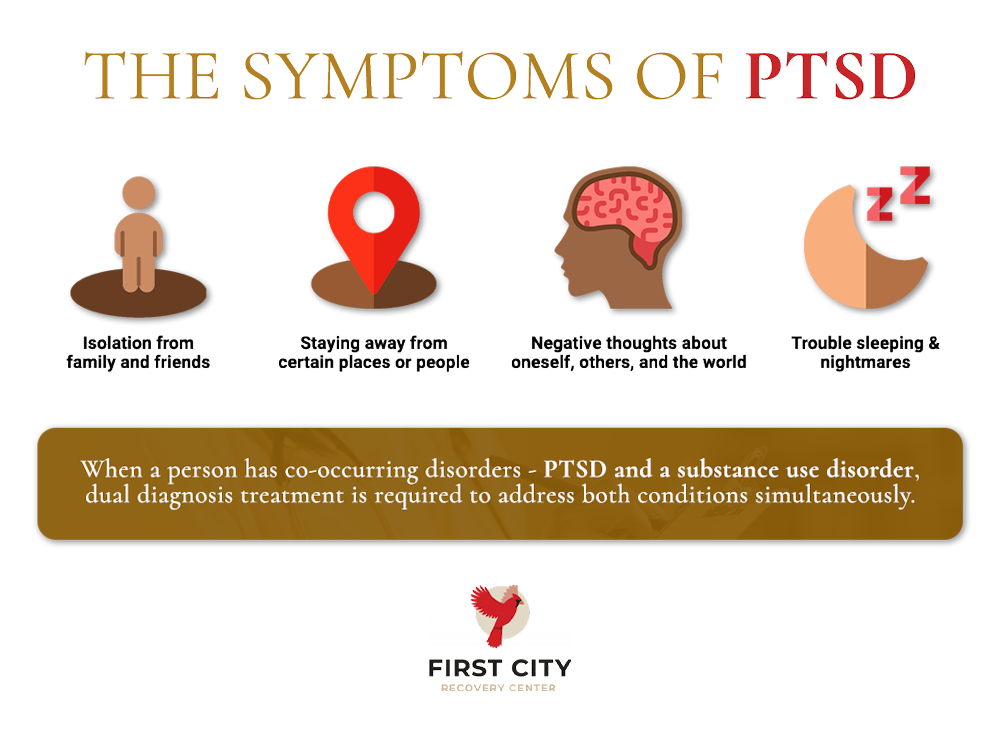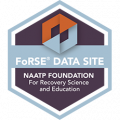PTSD And Substance Abuse Treatment
One of the most common contributors to drug addiction is stress. When people regularly experience extreme anxiety or stress, they may be pushed to cope with substances. Conditions such as Post Traumatic Stress Disorder (PTSD) which symptomatically feature stress and anxiety can similarly cause a person to seek relief through drugs or alcohol.
Over time, continuous use of substances can cause a person to, unfortunately, develop an addiction. The National Institute for Mental Health estimates that the lifetime prevalence of PTSD in people is as high as 6.8%. According to the National Center for PTSD, as many as 8 in 100 people suffer from PTSD. Further, research published by the National Institutes of Health indicates that nearly half of people who have PTSD meet the criteria for a substance use disorder (SUD).
When a person has co-occurring PTSD and a substance use disorder, dual diagnosis treatment is required to address both conditions simultaneously. At First City Recovery, we offer dual diagnosis treatment that is comprehensively designed to treat both conditions, so addiction treatment patients can experience relief from addiction and learn to manage stress.
Table of Contents
ToggleWhat is PTSD?
PTSD is classified as a chronic anxiety disorder that can occur when a person experiences trauma of some kind. This includes but is not limited to:
- Military combat
- Serious accidents and injuries
- Experiencing natural disasters
- Acts of terrorism
- Sexual or physical assault during childhood or as an adult
- Losing a loved one such as a friend or family member
PTSD can develop in anyone who has experienced a traumatic event, but there are certain factors that may increase the risk. These include having a history of trauma, having a pre-existing mental health condition, and being exposed to ongoing stress or trauma. Additionally, PTSD can occur immediately following the traumatic event, or it can develop over time. It is characterized by four main symptom types: intrusive symptoms, avoidance symptoms, negative changes in mood and thought, and changes in physical and emotional reactions.
Intrusive symptoms are characterized by reliving the trauma through flashbacks or nightmares. Avoidance symptoms involve avoiding anything that may trigger memories of the trauma. Negative changes in mood and thought include feeling hopeless, negative, or detached from others. Changes in physical and emotional reactions can manifest as being easily startled, having trouble sleeping, or feeling on edge.
Risk Factors for PTSD and Drug Addiction
Many people experience trauma in their life, but not everyone develops PTSD after a traumatic event. There are several risk factors that may increase the likelihood of developing PTSD or drug addiction, including:
- Experiencing a long-lasting or severe trauma
- Lack of support from family and friends
- Exposure to ongoing traumatic events
- Having another mental health disorder, such as depression or anxiety
- Poor coping skills or insufficient social interaction
- Genetic factors such as a family history of certain mental health conditions
- Engaging in drug and alcohol abuse
PTSD is also common amongst certain populations of people. For example, military personnel and first responders are at a higher risk of developing the disorder due to the nature of their work. Women are also more likely to develop PTSD than men due to the increased likelihood of them experiencing sexual violence.
How can PTSD and Drug Addiction Co-Occur?
 When a person experiences a traumatic event, the brain begins to produce fewer endorphins. Endorphins are natural chemicals that help to numb pain and make a person feel good. A reduction in endorphins can lead to feelings of hopelessness, anxiety, and depression. Drug addiction may develop as a way to self-medicate these negative emotions.
When a person experiences a traumatic event, the brain begins to produce fewer endorphins. Endorphins are natural chemicals that help to numb pain and make a person feel good. A reduction in endorphins can lead to feelings of hopelessness, anxiety, and depression. Drug addiction may develop as a way to self-medicate these negative emotions.
PTSD and drug addiction often co-occur because the same areas of the brain are affected by both conditions. The area of the brain responsible for fear and anxiety is also responsible for the euphoric feeling that comes from using drugs. This can make it difficult for a person to recover from both PTSD and drug addiction. Further, substance abuse can worsen the symptoms of PTSD and make it harder to recover from the disorder.
Concerningly, there is a high rate of drug abuse amongst people who have PTSD. One example of how prevalent addiction is in groups that experience trauma is the rate of addiction for veterans of war. According to The U.S Department of Veteran Affairs, nearly three-quarters of those who have survived violent or abusive trauma report having an alcohol use disorder (AUD).
Types of PTSD
There are several types of PTSD. The types differ in how long the symptoms last, how severe the symptoms are, and what type of event or events trigger the disorder. The most common types of PTSD are:
- Acute stress disorder (ASD): Acute stress disorder (ASD) is a short-term reaction to a traumatic event. ASD symptoms typically begin within three days of the event and last for up to one month after the event.
- Chronic PTSD: Chronic PTSD is a long-term reaction to trauma. For chronic PTSD to be diagnosed, symptoms must last for more than one month and ideally should be present for six months or more.
- Complex PTSD: Complex PTSD is a type of PTSD that can develop after exposure to prolonged or repeated trauma, such as that experienced in child abuse, domestic violence, or war.
- Comorbid PTSD: Comorbid PTSD is a type of PTSD that occurs alongside another mental health disorder, such as depression, anxiety, or substance abuse.
At times, PTSD is confused with other stress and anxiety disorders because of overlapping symptoms. However, PTSD starts with a normal stress response. When that response is not treated or is severe enough, it can develop into PTSD.
Additionally, PTSD affects people of all ages, including children. It is important to get help if you think you might have PTSD. PTSD can be treated and managed effectively with therapy, medication, or both.

Dual Diagnosis Treatment for PTSD and Drug Addiction
Dual diagnosis treatment is the best option for individuals who require help for both PTSD and addiction. In this type of treatment, both disorders are addressed simultaneously by a team of specialists. PTSD and drug addiction patients can expect to engage in a number of behavioral therapies that are effective in treating substance use and mental health disorders at the same time.
Mental health conditions and addiction commonly occur together. While they may or may not have been caused by the other, they can make either condition worse. When addiction and mental illness are both present, it’s important to treat both conditions. That way, you have the best chance of achieving lasting recovery.

Types of Therapy for PTSD and Drug Addiction
Treatment for PTSD and addiction often requires a combination of therapies. This is because therapy can help you understand your thoughts and feelings about the trauma. It can also help you manage your symptoms and develop healthy coping mechanisms.
While in therapy, patients with PTSD and drug addiction may:
- Work with a therapist to process the trauma
- Learn how to manage symptoms of PTSD
- Develop healthy coping mechanisms
- Address any underlying issues that may be contributing to the addiction
- Learn about the dangers of substance abuse and how to avoid trigger situations
- Participate in group therapy sessions with other
Therapies used for PTSD and addiction might include:
- Cognitive behavioral therapy (CBT): CBT is a type of therapy that has been shown to be effective in treating PTSD. CBT can help you change the way you think about the trauma and help you manage your symptoms.
- Dialectical behavior therapy (DBT): DBT is a type of therapy that can help you manage your emotions and cope with stress. DBT can also help you develop healthy coping mechanisms.
- Contingency management: Contingency management is a type of therapy that uses rewards to help you stay in treatment and abstain from drugs.
- Assertive community treatment: Assertive community treatment combines community outreach with individual therapy. This type of therapy has been shown to be effective in treating people with addiction and mental health disorders.
- Motivational interviewing: Motivational interviewing is a type of therapy that can help you explore your motivation to change your behavior.
- Therapeutic communities: Therapeutic communities are residential treatment programs that provide a structured, supportive environment.
- Support groups: Support groups can provide social and emotional support to people with addiction.
The goal of therapy is to help people with addiction understand their illness, develop a support system, and learn coping skills. When you attend treatment for PTSD and drug addiction at First City, we assess what combination of therapies will work best for you.
Comprehensive Treatment for PTSD and Addiction with First City
At First City Recovery Center, our dual diagnosis program for PTSD and drug addiction offers comprehensive treatment that addresses the underlying causes of your illnesses. Our evidence-based therapies are designed to help you heal from trauma, develop healthy coping skills, and build a foundation for long-term recovery.
If you are struggling with PTSD and addiction, we encourage you to reach out for help. At First City Recovery Center, we offer compassionate, individualized care that can help you recover your health and your life. Contact us today to learn more about our dual diagnosis treatment program.

MD, Psychiatrist
Dr. Vahid Osman, MD is a psychiatry specialist in Indianapolis, IN.
Dr. Osman completed a residency at Austin State Hospital. He has over 32 years of experience in Psychiatry & Behavioral Health. He is board certified by the American Board of Psychiatry and Neurology.





